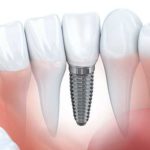
There are two primary types of dental implants, and the option you go for will be determined by the size of your jawbone. How the implants are incorporated into your treatment program is something you and your dentist will decide together so getting a consultation at your local dental clinic is important.
Types Of Dental Implants
Endosteal implants
Endosteal implants are what you’re likely to see most often when researching the topic because they are used most commonly. They look like screws and are embedded into your jaw when your bone is dense and wide enough.
Subperiosteal implants
In the event that your jawbone is too small for endosteal implants, subperiosteal implants are likely to be recommended. A subperiosteal implant is placed above your jawbone to prevent further bone loss.
Conventional or standard dental implants
Conventional implants are the same size as a natural tooth. Conventional implants can be used to replace a single tooth or a few missing teeth. A conventional implant will be embedded in your jawline using metal screws.
Fixed or removable bridgework
Dental bridges and implants are vastly different but it is possible to have a bridge that is supported by implants. A dental implant can be used to provide support for a removable bridge, making it a lot more secure than the bridge would be on its own.
Micro and mini implants
Mini implants are only a little smaller than conventional implants but they make use of smaller screws. They also occupy less space in the mouth. Micro implants are even smaller and are used when the spaces between the teeth are too small for a conventional implant to be placed, and when the patient does not want to wear a bridge.
Micro and mini implants can also be used as temporary solutions.
Temporary implants
If your mouth needs to heal before a permanent implant can be placed, your dentist may recommend temporary implants for a short interval. Once your mouth has healed the micro implants will be replaced by full sized or conventional implants.
Over-dentures anchored on dental implants
In the event that you have lost all the teeth along your jawline, your dentist is likely to recommend over-dentures. An over-denture helps to protect against bone and tissue loss, which is likely to occur if your dentures rub against your gum line. By using an implant the denture can be elevated higher than the gum line so that the bone underneath is protected.

Chat to your friendly dentist at Dental266 to find out about the dental implant option best suited to you.
Call us to schedule a consultation near you and restore your confidence today: (02) 9051 0600 .






